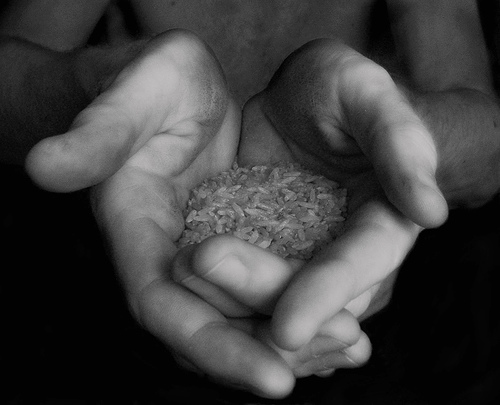Fifth Sunday after Pentecost Lectionary Reflection
June 27, 2021*
For if the eagerness is there, the gift is acceptable according to what one has–not according to what one does not have. — 2 Corinthians 8:12
So what’s the deal with this prime stewardship lesson popping up after Pentecost? Wouldn’t it be easier to focus on that funeral lesson from Lamentations or these wonderful healing stories from Mark? I mean, come on, who really wants to talk about money in the church anyhow? That uncomfortable topic ranks right up there with politics and religion. Luther even wrote something about the last part of the person to be converted is the wallet (my paraphrase), so why should I even suggest focusing on the epistle?
 There are at least a couple of compelling reasons to give this lesson center stage in your teaching and preaching this Sunday. First, and foremost, a wise bishop once reminded me that every sermon should be a stewardship sermon. Secondly, and quite timely, our current cultural climate and economic dishevelment provide fertile soil for a countercultural message about the power of community that both lives together and gives together.
There are at least a couple of compelling reasons to give this lesson center stage in your teaching and preaching this Sunday. First, and foremost, a wise bishop once reminded me that every sermon should be a stewardship sermon. Secondly, and quite timely, our current cultural climate and economic dishevelment provide fertile soil for a countercultural message about the power of community that both lives together and gives together.
The context for the epistle lesson is Paul’s collection for the impoverished Jerusalem church. Paul writes to the Christians of Corinth to encourage them to complete their commitment to assist in this project. He uses the powerful example of Jesus as selfless steward. Paul reminds the Corinthians that because we have received abundantly from God, we can in turn give abundantly. For a fine theological reflection on this passage, see Carla Works’s comments this week posted on the workingpreacher.org website.
I often hear pastors and other leaders in church circles lamenting about poor giving and compassion-fatigue when faced with yet another opportunity to support a mission or ministry. Sometimes the concern is expressed as “nickel and diming folks to death” or as a fear that supporting mission projects or sending funds to adjudicatory bodies might hamper operating funds or church maintenance needs. There seems to be quite enough of the scarcity mentality to go around, and lessons like this one can help address and counter such rhetoric and fear.
 According to Paul, we aren’t to give out of a sense of scarcity or fear or even obligation that demands we put ourselves in jeopardy. Rather, we are to give out of a sense of eagerness to share and willingness to help others in a spirit of abundance, grace, and love. The Christians in Corinth were being asked to give to people with whom they did not have personal relationships and who might not even see them as equal partners, given the whole Jew/Gentile tension of that time. They were simply asked to give out of their abundance so that others might have a fair share and an opportunity to live and thrive. Paul is preaching a culture of giving, of community participation in the common good.
According to Paul, we aren’t to give out of a sense of scarcity or fear or even obligation that demands we put ourselves in jeopardy. Rather, we are to give out of a sense of eagerness to share and willingness to help others in a spirit of abundance, grace, and love. The Christians in Corinth were being asked to give to people with whom they did not have personal relationships and who might not even see them as equal partners, given the whole Jew/Gentile tension of that time. They were simply asked to give out of their abundance so that others might have a fair share and an opportunity to live and thrive. Paul is preaching a culture of giving, of community participation in the common good.
Today, the church has the opportunity to be a unique community that lives and gives out of a sense of abundance and a commitment to sharing. We can walk a different path from the world that says “me first” and “better hang on to what you have because there might not be more.” We believe that humble bits of bread and sips of wine are enough to strengthen and sustain us. Why question whether our time, talents, and resources can really make a difference? When given lavishly and in Christian love, our humble contributions can combine with those of others to do great things.
A hundred dollars may not seem like much in North America, but it might provide school tuition for a child in another country. The ability to change oil might seem pretty mundane, but that ability combined with a few hours of time at a weekend church-sponsored car clinic could save a single mother enough money to buy groceries and keep her car running. Raking a yard or preparing and delivering a few meals could help a senior citizen stay in his home longer and provide important and life-affirming contact. We all have something to give and share–no matter how humble or insignificant it might seem.
God is at work in the world, and the winds of the Spirit are enlivening and inspiring us to be part of communities of faith that understand giving and sharing as integral to their very existence. Our job as leaders is to help God’s people see the abundance around them, to identify their many and varied gifts, to inspire them to use and share these gifts, and to lift up the good and creative work they are already doing. God’s giving has no limits; by faith neither has ours.
In Worship
Create a Giving and Prayer Tree by bringing either a small live tree or a large bare branch into the worship space. Identify an existing ministry of the congregation or consider a new one. Provide blank paper leaves on which members may write prayers or pledge help with the project. Also “seed” the tree with a few small bills (or large ones if you are able). Invite congregation members to help “green” the tree with money, prayers, and promises. Try to identify a project where more than just money is needed–maybe it is a ministry to help start an after school tutoring program or a produce sharing ministry. Perhaps you have an existing ministry that needs a little jump start. Be creative. Once all the prayers, promises, and cash have been assembled on the tree, show the congregation how a giving community blossoms and shares life with others. Be sure to encourage and give thanks.
Alternately, create a bulletin board showing the many good ministries with which your congregation is involved–both directly and indirectly. Try to find pictures and make the board visually interesting. If you have projection capabilities, consider a PowerPoint presentation before worship or during the offering to depict the generous heart of your congregation. Center the visuals around text from this week’s epistle lesson.
With Youth
Why not host a showing of the film Pay it Forward? It provides some great opportunities for talking points about giving, serving, and sharing. For real examples of paying it forward in action, check this link featuring 10 pay it forward stories, or this story about State Bank in Fargo, ND, or this story about a former homeless man paying it forward by buying gas for others.
With Children
Talk with the children about eager giving and propose a “noisy offering” project. If possible, give each child a clean tin can. Make sure the open end has no dangerous edges. Choose a giving project or ministry that really means something to you and about which you can speak passionately. For me it would be tech4tanzania, a project bringing a computer lab and books to a university in Mbeya, Tanzania. A gift of $100 will ship a Pentium 4 computer loaded with software to help outfit the lab. The reason the cost is so modest is that many ecumenical partners have come together to make this project a reality. Check out the link! You might just want to get involved yourself.
Once you’ve picked your project, challenge children to save their change. Start them off by “seeding” the project with a small amount of change in each can. Give them a date to bring their cans back in, and ask the congregation to bring change on that day. When the appointed Sunday arrives, have the children walk through the congregation shaking their cans to collect the special offering. Have a large metal washtub or commercial stew pot waiting in front of the altar. When the offertory is played (perhaps choose a special joyful one) have the children accompany the regular offering to the altar shaking their change-filled cans. Allow each child to pour his or her can into the large one. Remind them (and the congregation!) on this day how many small gifts can add up to a lot and that we all have much to give and share with others.
*This reflection was first published in July, 2012.
Photos by Mr. Kris, Irish, and joshuatintner used under Creative Commons License. Thanks!




Leave a Reply